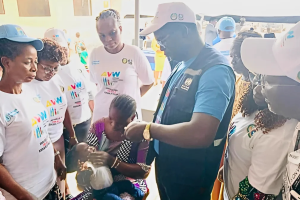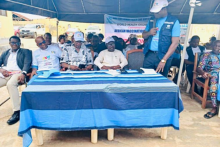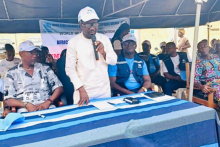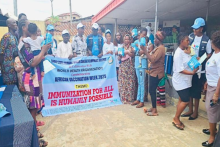Ondo State, WHO, partners and caregivers unite to promote vaccination during African Vaccination Week.
Akure, When 30-year-old Ajibola Ibukunoluwa walked into the Comprehensive Health Centre, Isolo in Akure South Local Government Area in Ondo State, she wasn't just bringing her three-month-old child for a routine immunisation shot—she was stepping into a movement.
It was the annual African Vaccination Week (AVW), an initiative led by the World Health Organization (WHO) to promote the use of vaccines to protect people of all ages against vaccine-preventable diseases across the African Region.
The commemoration was held nationwide from 24 to 30 April.
For Ajibola, vaccination is a must, as she understands the protection it gives against vaccine-preventable diseases such as measles, yellow fever, hepatitis B, and polio, among others.
"Immunisation reduces mortality in children, and I'll keep encouraging others to get their children vaccinated. The vaccination week has helped raise awareness among mothers," she said.
Like Ajibola, 70 other mothers and caregivers gathered at the facility on 24 April 2025 to lend their voice in raising awareness of the importance of vaccination as the Ondo State Government through Ondo State Primary Health Care Development Agency (OSPHCDA), in collaboration with WHO and key partners, including Clinton Health Access Initiatives (CHAI) and UNICEF mark the 14th edition of African Vaccination Week.
With this year's theme, "Immunisation for all is humanly possible," the event aimed to renew public commitment to life-saving vaccines and promote equal access for every child, regardless of location or circumstance.
Hassan Olayinka, another caregiver whose 9-month-old baby received the measles, yellow fever, and meningitis vaccines at the event, expressed her gratitude to the government, WHO, and partners for making the vaccines accessible and available to children in the country.
"Immunisation is a very powerful tool. It prevents children from falling sick. I am happy with the services I received today and will advise mothers in my neighbourhood to take it seriously. I thank the State Government and partners like WHO for organising this."
The Special Adviser to the Governor on Health, Professor Michael Sinmidele Odimayo, representing the state governor, called on mothers to become advocates for immunisation: "Inform those ignorant about vaccination and its importance. Vaccination is a human right."
He highlighted the state's health priorities—including free Hepatitis B treatment and the expansion of the health insurance scheme.
Delivering WHO's goodwill message on behalf of the Country Representative, Dr Walter Kazadi Mulombo, Dr Adebayo said: "The African Vaccination Week is a reminder of WHO's commitment to ensuring every child has access to life-saving vaccines.
Immunisation is a human right, and this year's theme is a powerful call to action. We appreciate all caregivers and partners championing this cause."
During the event, Professor Odimayo and Dr Adebayo administered doses of the Oral Polio Vaccine (OPV), Rota vaccine, and Vitamin A to eligible children.
In total, 70 children were immunised. To encourage continued participation and advocacy, all 70 caregivers received diapers as incentives and were recognised as "immunisation champions."
Also in attendance were the Permanent Secretary of the Hospitals Management Board, Dr Ayodele Ojo Adiji; Director of Disease Control and Immunization, Dr Victor Adefesoye (representing the Executive Secretary of OSPHCDA); WHO State Coordinator (represented by Dr Ibraheem Adebayo); Ward Development Committee Chairman, religious leaders, and representatives from partner organisations.
The presence of health workers, local media, and public and private stakeholders added weight to the message that immunisation is not just a medical intervention—it is a community-driven commitment to protecting children's future.
For mothers like Hassan and Ajibola, the experience was more than symbolic—it reaffirmed their role in safeguarding their children's health and a testament to the power of collaboration between governments, communities, and global partners like WHO.






